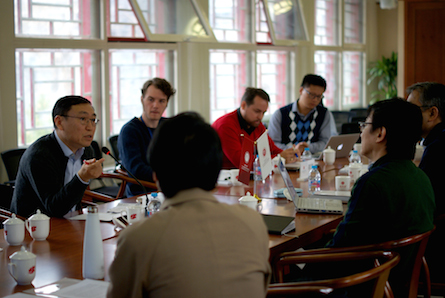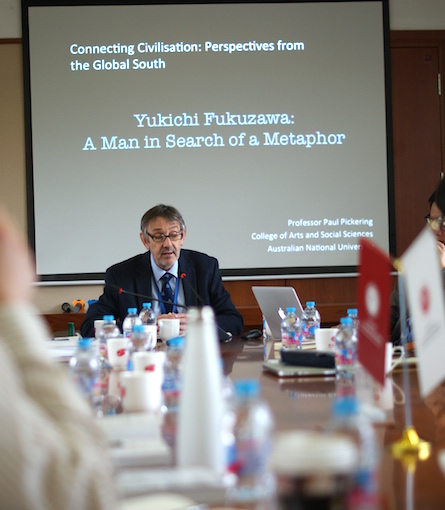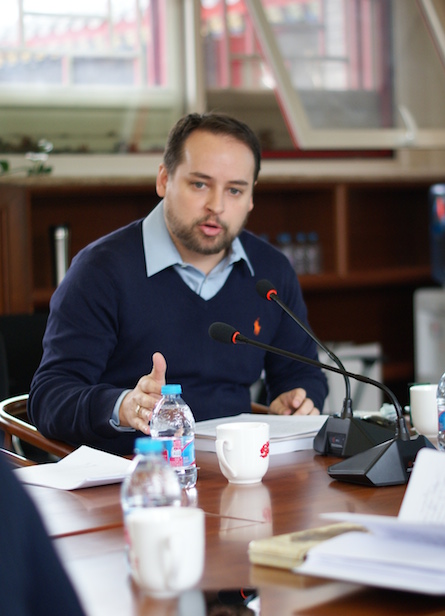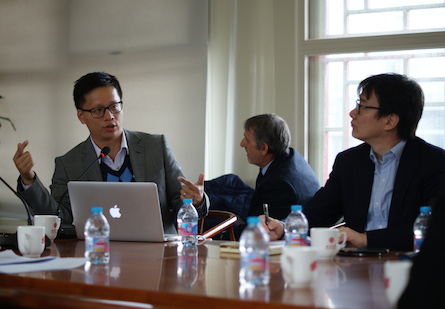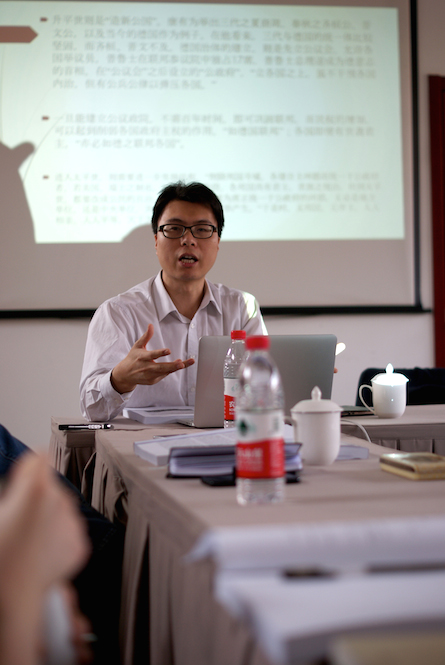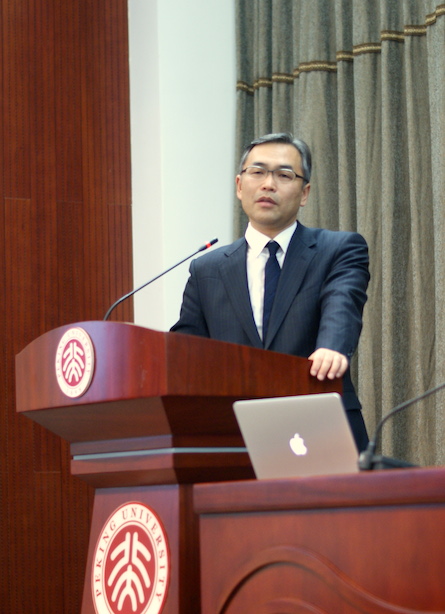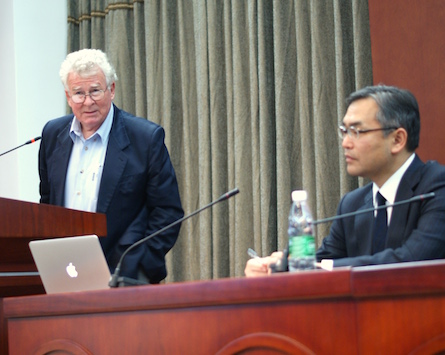[Report] PKU-UTokyo Spring Institute 2017 (4)
Report on 17th March 2017
The 17th was a long day: along with the usual two sessions in the morning and the afternoon, there was another session in the evening, which was the public lecture by our very own Professor Takahiro Nakajima from the Advanced Institute on Asia Studies. Students’ faces had started to show signs of fatigue, but that immediately disappeared the moment the Professors’ lectures began: everyone was listening intently, taking notes, and nodding in agreement.
The morning session was titled “Connecting Global Civilization: Perspectives from the Global South” and the Professors from the Australian National University each gave a talk relating their research interests to the larger theme of this conference, civilization and modernity in East Asia.
The first speaker was Professor Paul Pickering, Dean of College of Arts and Social Sciences, who specializes in Australian, British and Irish History. His talk, “Yukichi Fukuzawa: A Man in Search of a Metaphor” began with highlighting the multitudes of metaphors that Fukuzawa as an attempt to define civilization. Some of the phrases raised were “like an ocean that rivers flow into”, “like a great stage” and “like a warehouse.” Then, Professor Pickering explored the etymology of civilization, and emphasized the active nature of the inherently embedded in the term; a process of being made civilized by an external force. This notion was put in contrast with Fukuzawa’s concept of civilization, and reiterated the distinctive nature of the word “civilization” in Fukuzawa’s writings.
Dr. Benjamin T. Jones built upon the previous talk with his talk titled “Reimagined Australian Civilization: from exclusivity to engagement” that explored the Australian experience in regards to civilization. Originally, civilization was understood in the British colonial sense, but because of the multicultural nature of Australia’s population, this concept became one that needed to be overcome. Dr. Jones drew a comparison between the Japanese and Australian experiences in which for both the nations, the process of civilizing manifested in an exclusionary form of nationalism. He concluded his talk with exploring how education was utilized in the civilizing mission, which brought about tragedies such as the assimilation of indigenous peoples.
The third talk, “The History of Chinese Heritage” by Dr. Yujie Zhu, shifted the focus from Australia into China, and highlighted how the Chinese cultural identity has been a cycle of deconstruction and reconstruction, in which narratives of “exceptionalism”, “cosmopolitanism” and “nationalism” come and go. Dr. Zhu raised these cultural discourses in chronological order, such as the notion of New-Chineseness and internal orientalism; the notion of Yellow as opposed to Blue Civilization; the World Heritage fever; and the theory of One Belt One Road. Throughout the talk, the urge to connect back to the national identity as well as the nostalgia for the past appeared as recurring themes, and the talk was concluded with the current situation in which the Chinese people actively are participating in “traditional” ritual practices such as group weddings, which Dr. Zhu described as “romantic consumption” or a form of hedonism.
An extremely lively discussion followed the three talks: some of the topics that were discussed were, the notion of barbarism as opposed to civilization; the possibility of interpreting Australia as a “frontier”; and cultural consumption of national identity and sites of memory in the various countries.
Professor Yongle Zhang of the Law School at Peking University introduced us to how civilization and modernity was negotiated in the writings of the Qing dynasty intellectual, Kang Youwei, in his lecture “The Rivalry of Nations: Kang Youwei and the Decline of the Vienna System”, based on his upcoming book. Professor Zhang explored Kang Youwei’s notion of how China should follow in the footsteps of Germany, since in Kang’s view, Germany had the potential to challenge the concert of powers within Europe. However, it was later proven that Kang’s predictions that Germany will unify all of Europe was mistaken, and Kang had to subsequently revise his theories in his later years. Professor Zhang concluded his lecture by highlighting the limitation of Kang, which was his fear towards social change and revolution, as well as internalization of the hegemonic mode of thought of the Vienna System, such as Kang’s upholding of constitutional monarchy.
The lecture sparked many questions from the floor, such as how to understand Kang Youwei’s rewriting of the past in relation to his distinct framework that stemmed from his imagination; or what was Kang’s understanding of the state, if he found the notions of the modern state or the Marxist-Leninist state insufficient; and about Kang’s views on national religion.
Professor Nakajima’s public lecture, “Enlightenment and Religion in Translation” focused on the moment in which East Asia was confronted with modern discourses such as enlightenment and religion, that needed to be translated and adapted to fit the East Asian context. Professor Nakajima opened his lecture by introducing Leibniz’s encounter with China and Chinese philosophy, that provided Leibniz with an alternative idea of the world. Borrowing Jullien’s notion of “universalizable”, which may involve everything in the universal, as opposed to “universalizing,” a process of creating the universal, Professor Nakajima argued that the universal in Leibniz could be interpreted as a form of “universalizing”, since Leibnitz exposes his readers to the heuristic and unstable endeavor of translation, transformation and transposition. Then, passages from writings of Yukichi Fukuzawa, Hu Shi, Uchimura Kanzo and Ham Seok-heon were raised to demonstrate how modernization and religion were conceptualized by nineteenth and early twentieth century Japanese, Chinese and Korean intellectuals. Professor Nakajima emphasized the importance of interpreting these trans-national East Asian experiences as something shared, and how comparison has the potential to illuminate another kind of universality.
Professor Roger Ames, academic director of Berggruen Institute’s Philosophy and Culture Center and Humanities Chair Professor at PKU was the commentator for this lecture, and he built on Professor Nakajima’s talk by raising the notion of the general as opposed to the universal, in which because the universal is something located outside time and space, one counterexample may defeat it, whereas for the case of the general, counterexamples serve to further strengthen it. Professor Ames also spoke about “universalizing”, in its gerundive form, by raising the concept of the Dao, which he calls “way-making”, as especially representative of the process-based cosmology that is contrary to the Aristotelian notion of substance.
Professor Nakajima answered to this by noting how there are pitfalls when one attempts to use the notion of universality, but if one thinks about the universal in a gerundive manner, one can still be critical.
Although I had pledged to myself to review my notes as well as the assigned readings every night, I was too exhausted after such a packed day: all I did was look over the photos of the beautiful blossoms and fluffy cats I took at the Peking University campus.
Erin Kitagawara (The University of Tokyo))







